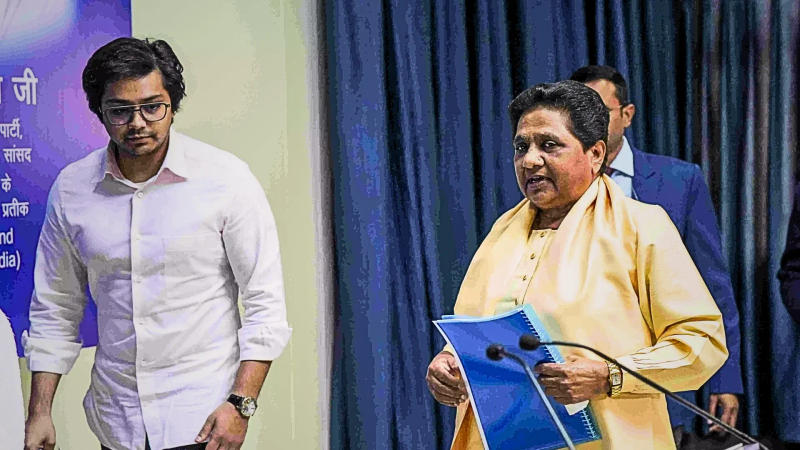Published 13:53 IST, January 15th 2024
Choosing Parijan Over Bahujan Politics: How Mayawati Kept BSP's Star Lit at Home
Mayawati's rise from humble beginnings has been called a "miracle of democracy" by many political stalwarts including PV Narasimha Rao, the former PM.

Lucknow, Uttar Pradesh: The BSP leader and first female Dalit Chief Minister in India, Mayawati, turned 68 on January 15. Mayawati's rise from humble beginnings has been called a "miracle of democracy" by many political stalwarts including PV Narasimha Rao, the former Prime Minister of India. On her 68th birthday, let's deep dive to chart her Dalit outfit's journey from ‘Bahujan’ to 'Parijan' politics.
Mayawati's announcement that her nephew, Akash Anand, will assume the role of her 'political successor,' marks a shift in the Bahujan Samaj Party's (BSP's) ideological notion towards a familial succession model. This decisive step reflects the broader trend of family-centric politics in regional parties aiming to secure their legacies.
Mayawati naming her nephew as her successor in the Bahujan Samaj Party at a crucial party meeting in Lucknow on December 10, 2023, has not surprised many as in June 2019 she made clear indications of the future of the party's leadership by making Anand BSP's national coordinator.
Kanshi Ram, the political mentor of Mayawati, didn't inherit the party. Ram included her as a member of his team when he founded the Bahujan Samaj Party (BSP) in 1984 with an aim to represent Bahujans (community in majority), referring to Scheduled Castes, Scheduled Tribes, and Other Backward Classes (OBC), along with religious minorities.
Reflecting vision to reward ordinary BSP workers' hard work and talent, Ram named Mayawati his successor on December 15, 2001 and she rose to the ranks of national president of the party in September, 2003. With passing time and rising trend of family-centric politics, Mayawati chose an easier way of keeping the party's star lit at home.
After the December 10 declaration of her nephew becoming her political successor, Mayawati kept Kanshi Ram's vision of rewarding ordinary talented BSP workers also at home. In the midst of the sharp switch to ‘Parijan’ politics, the BSP saw ‘Sarvajan’ movement.
In 2007, 'sarvjan (inclusive politics of development for citizens regardless of caste they represent)’ politics helped the BSP wrest power in Uttar Pradesh on its own where it won 206 of the 403 assembly seats cornering 30.43 per cent votes. However, the rise of Hindutva politics and grassroot connect of Narendra Modi's Bharatiya Janata Party (BJP) dethroned the regional outfits born out of caste engineering.
Updated 13:53 IST, January 15th 2024




